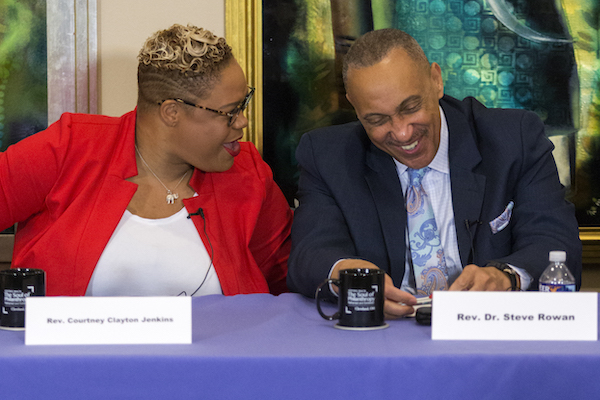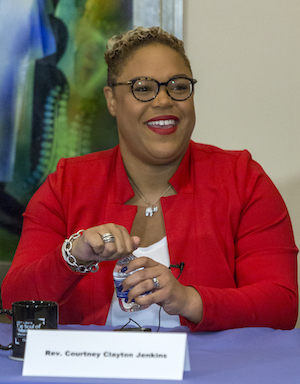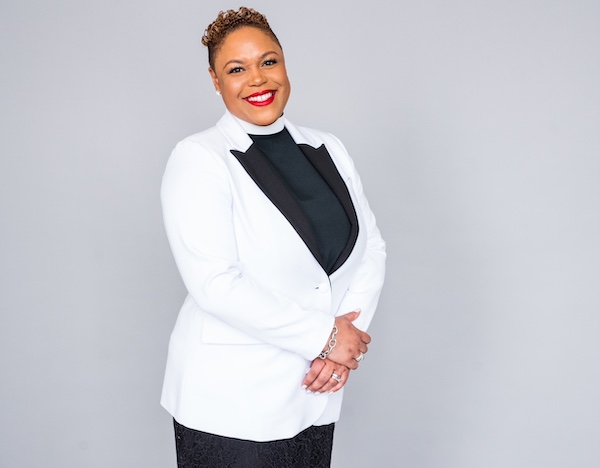Reflecting on ten-year pastorate
Courtney Clayton Jenkins was called as senior pastor of the former Euclid Ave. Congregational Church in 2011, a scant few months after fire completely destroyed the church’s long-standing home at 9606 Euclid Ave. Just 27 years old, she was the youngest pastor ever chosen to head the historic multicultural congregation. She was also the first woman and the first African American.
Ten years later, under her leadership the church has a new name — the South Euclid United Church of Christ (SEUCC) — and a new home, situated on a ten-acre campus on Bluestone Avenue in South Euclid, and more than 600 active members. The property was purchased from the Cleveland Catholic Diocese which had closed its Saint Mary Margaret Catholic Church at the corner of Belvoir and Bluestone. The new campus reflects an investment of $8.15 million in brand new construction and renovation.
“It was a huge challenge and I remember saying to God this is the start of a really great story,” said Clayton Jenkins, who admits to feeling way over her head when she started out ten years ago.
What kept her going, she says, is knowing the congregation needed more than a leader to guide them out of the ashes. They needed a pastor to sit with them, build trust with them and help them deal with the grief, she said.
The level of confidentiality required of a pastor who listens regularly and empathically to the trials and tribulations of her members, can take a personal and emotional toll.
“For the first year, I walked the church really as its pastor just letting them grieve. These were sacred spaces,” she said, recognizing the many significant life events — baptisms, weddings, funerals, et al. — the members had experienced in the more than century old building that had literally disappeared overnight without a trace, the raging fire perhaps caused by a bolt of lightning.
“After that, I was clear they needed a different kind of leadership in order not to remain in the ashes but to rise from it,” she said.
Having to pivot her leadership to rebuild simultaneously both a congregation and a new church home was the hard part. “We could not afford to build a building and have no people to put in it. We also could not afford to build up all the people and not have a permanent home that we could be known for and do ministry around,” said Clayton Jenkins.
In hindsight, she’s glad to have done that work in her late twenties and early thirties; Jenkins not sure if she would have the energy to do it these days. She is currently a mom to a seven-year-old. “It was really hard,” she said.
In our candid conversation, Clayton Jenkins discussed how, in addition to in addition to dealing with the challenges of the congregation’s devastating loss, she had to overcome doubts people had about her skill set and leadership based on her race, gender, and age. Some members didn’t want her there, she said, and tried to remove her from the role.
“It was deeply layered and compounded, if you will, but it was nobody but God who walked us to where we are today,” said Clayton Jenkins.
In addition to feeling under divine influence and absolute clarity that she was called to this congregation and this work, Jenkins also sought the counsel of elders like the Rev. Dr. Otis Moss Jr., who had led congregations through trying times. Books such as I Refuse to Lead a Dying Church by Paul Nixon and others also help guide her work.
And, most importantly, Clayton Jenkins sought professional counseling.

Sharing a light moment with a fellow pastor at Soul of Philanthropy event [2019]
The level of confidentiality required of a pastor who listens regularly and empathically to the trials and tribulations of her members, can take a personal and emotional toll. Jenkins recognized her own need for an outlet to process and help heal the wounds that come along with the work.
“I’m very much a wounded warrior and yet I can’t allow my wounds to become infected because it will manifest in the congregation. I have to shepherd myself well first before I can shepherd people.”
Clayton Jenkins’ biggest accomplishment
When thinking about her accomplishments, Clayton Jenkins doesn’t mention the building project or expanded membership. She is most proud of the fact that she and her team have turned away from making fans of the ministry as opposed to disciples of Jesus Christ.
Several years ago, she sensed a fan culture of herself and the church beginning to emerge.
“I felt that lacked integrity. I’m not here to point people towards me,” she said. “I’m here to point people towards Christ.”
With that grounding, Clayton Jenkins and her staff started to make changes.
“We have been establishing the type of church, I believe, the type of church Jesus would want in the 21st Century.”
This style of pastoral leadership, she said, is committed to making disciples of Jesus Christ who are committed to understanding that all the work doesn’t fall on the pastor and the church hierarchy but doesn’t all fall on the members either. “We have a responsibility to one another,” she said.
They’ve been working on what it means to be disciples, for members to be in partnership with the church and for the church to be in partnership with the members.
Since the pandemic, she’s been preaching on what she calls “Grown, Grown faith,” as Covid-19 doesn’t allow for simple answers like “just pray about it” when all seems lost.
“I feel like I’ve been preaching grown, adult, not-milk-but-meat sermons, and holding people accountable to their part in this,” she said.
She believes if someone has been a member for more than a year and is unable to pray over themselves in a moment of crisis, then she’s failing at her job.
Adjusting to pandemic
In November 2017, Clayton Jenkins pitched the “Brave New World” campaign to upgrade technology and develop the digital assets that would allow the church to stream online.
“I felt so silly,” she said. “Who has a capital campaign for something invisible? I felt silly but I heard God.”
After casting the vision and raising sixty percent of the goal needed to fund the project, Clayton Jenkins couldn’t find the right person to hire. She felt a bit weary, not wanting the congregation to feel she had led them down a primrose path. But early last year, two women whom she had seen as highly qualified and maybe beyond the reach for the church’s budget, applied for two positions. The final interviews wrapped up exactly one week before the country shut down due to Covid.
“We all pulled together and made that first Sunday happen, and I hired them that Monday,” Clayton Jenkins said. She added that she doesn't know if the church would have had the financial resources to sustain the positions until now if she had hired them two years ago.
“God really held that off,” Clayton Jenkins said. “God had a way of unfolding that plan. I believe our church has pivoted marvelously.”
"We’re not afraid to fail.”
In addition to Sunday morning worship, South Euclid UCC hosts four youth ministry programs based on age group. An average of 125 people log in, weekly, mid-week for small groups. South Euclid now has what Clayton Jenkins calls an “online campus,” with members in 12 different states. They even go through new member orientation.
In a sign of the times, the woman who coordinates the member portion of The Bin, the church’s food pantry, lives in New York while there are members from as far away as Los Angeles.
The uncertainty of Covid makes it difficult to predict the future direction of South Euclid UCC. However, Clayton Jenkins does see the church continuing to push the boundaries of imagination and discipleship, and their intersection. She says the church will continue exploring what it means to be a disciple of Jesus in 2021, and how to take the routines of religiosity and return it to a sacredness through creativity?
“Over here we’re not afraid to fail.” she said.
Responding to the needs of the community and fighting for social justice
South Euclid UCC recently decided to embark upon the “Paid in Full” campaign, to assist with housing, mortgages, and evictions in response to Covid-19. Despite the church’s own budget being tight, they set a goal to raise $35,000 with the anticipation of helping 70 households.
When the finance manager raised an eyebrow, saying they had to make payroll, Jenkins responded, “How can we be people of faith and live in fear?”
They met the goal and delivered this past Easter Sunday.
The church started The Bin Food Pantry five years ago, feeding 125 families monthly at an annual cost $25k annually. Today, the number has doubled.
“It takes us over 100 volunteers, all month, to make this happen,” said Jenkins. She often reminds recipients it’s not her sole doing.
“This is the collective gift of this church back to this community. Even the member of our church who gave a dollar helps groceries get on someone’s table. I’ve always marveled at the generosity of South Euclid and what we’re able to do.”
“Jesus died because he was messing with a system that was content with keeping poor people poor … He was messing up the order that kept people comfortable.”
When Covid first hit, South Euclid UCC gave $5,000 to small business owners in Glenville and 500 meals to seniors. They also gave scholarship dollars to students.
“The beauty of our church is that we’re really clear no one person gets the credit and we all understand that little becomes much in the hands of the Master,” said Clayton Jenkins.
The social justice component of the ministry is important to her as well because it speaks to the scripture that says, “Man does not live on bread alone” but Clayton Jenkins also knows man still needs bread to live.

Panelist at Soul of Philanthropy event, 2019.
She also loves the biblical story of the Good Samaritan.
“I understood that story to be saying, yes, some of us need to be the Good Samaritan… and yes feeding people is outreach work… But social justice is saying, ‘why is this part of the neighborhood falling apart, why certain people can’t walk down the street…’” she said, with the understanding that we need to dismantle some systems that affect how we live.
For example, she’s moved beyond voter registration to voter education. What good is it if you register people to vote and they think they only need to show up for presidential elections, she asked.
“Jesus died because he was messing with a system that was content with keeping poor people poor, rich people rich… That’s why they crucified him. He was messing up the order that kept people comfortable.”
Growing as a pastor
Over the last ten years, Clayton Jenkins has matured as a faith leader. “I have learned that what really matters is to empower people to empower themselves and their community,” she said.
She says when she first came into ministry she was drawn to its aesthetics. She now knows that emphasis only creates fan ministry, and fails to draw people to Christ.
“I want the record to reflect that I created disciples, that I strengthened disciples… And for it to be known it was done through South Euclid where Courtney Clayton Jenkins just so happens to be the pastor.”
• • •• • •















